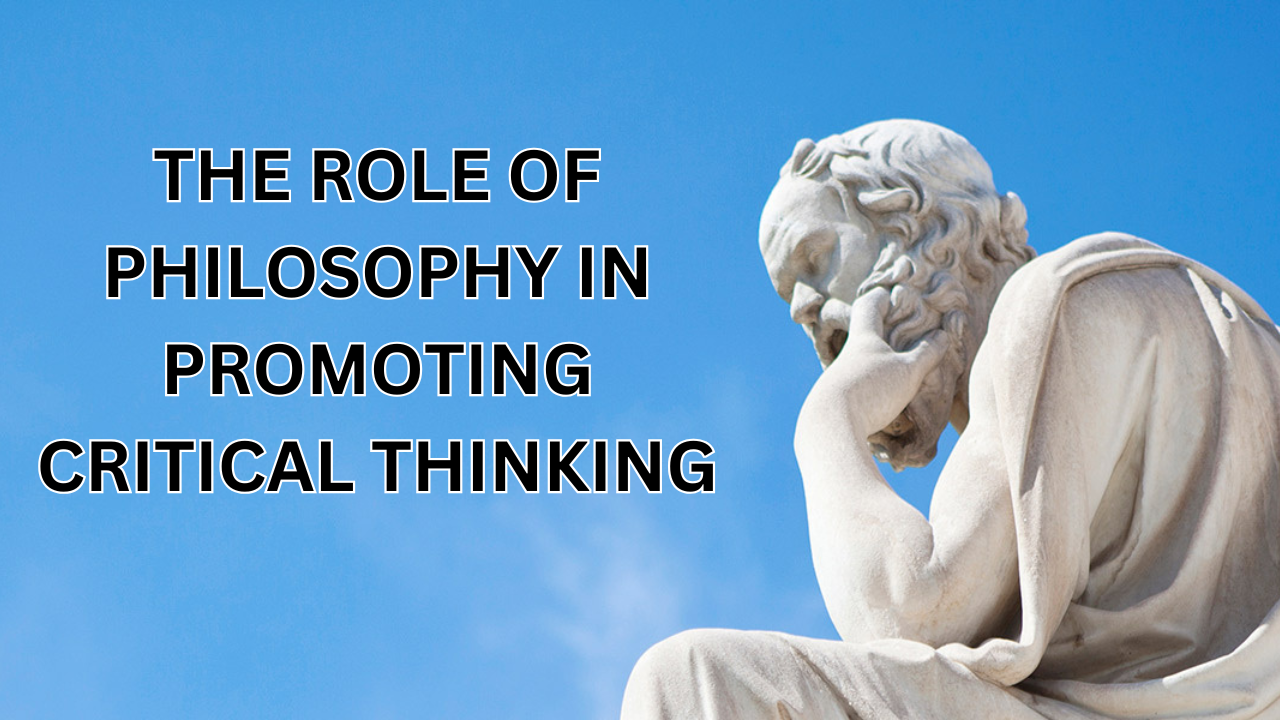Philosophy plays a vital role in fostering critical thinking by challenging individuals to question assumptions, analyze arguments, and consider multiple perspectives at its core philosophy is the pursuit of wisdom encouraging people to reflect on fundamental questions about the existence of morality and knowledge by engaging with philosophical concepts individuals develop the ability to think more deeply and systematically about complex issues moving beyond surface-level understanding.
Critical thinking thrives on the skills that philosophy nurtures such as logical reasoning and the evaluation of evidence philosophical discussions often involve dissecting abstract ideas and testing the strength of arguments which cultivates intellectual discipline and a more open-minded approach to problem-solving it also encourages curiosity and skepticism prompting individuals to seek clarity and avoid accepting information at face value.
In a world inundated with information and diverse opinions the capacity to think critically is essential for making informed decisions philosophy not only sharpens this ability but also equips individuals with the tools to engage constructively in debates appreciate differing viewpoints, and address ethical dilemmas thoughtfully Philosophy serves as a foundation for critical thinking, guiding individuals toward greater intellectual autonomy and a deeper understanding of the world around them.
The Importance of Critical Thinking:
Critical thinking is a cornerstone of personal and professional success, enabling individuals to navigate the complexities of life with clarity and sound judgment it involves the ability to analyze information objectively evaluate arguments, and draw reasoned conclusions all while maintaining an open mind in a world overflowing with data and conflicting viewpoints critical thinking helps distinguish credible information from misinformation fostering better decision-making it encourages individuals to ask meaningful questions challenge assumptions and seek evidence before forming opinions rather than relying on biases or superficial understanding.
Beyond its practical applications, critical thinking plays a pivotal role in fostering personal growth it sharpens intellectual curiosity allowing individuals to explore ideas and concepts deeply ability enhances problem-solving skills enabling people to approach challenges methodically and develop innovative solutions critical thinking promotes effective communication by helping individuals articulate their thoughts logically and understand others perspectives which are essential in building collaborative relationships.
Philosophical Methods for Promoting Critical Thinking:
Philosophical methods are powerful tools for cultivating critical thinking as they encourage individuals to engage deeply with ideas question assumptions and analyze problems from multiple perspectives one of the most effective philosophical techniques is Socratic questioning which involves asking a series of thought-provoking questions to uncover underlying beliefs and test the validity of arguments and foster a deeper understanding of an issue this method not only sharpens reasoning skills but also challenges individuals to consider alternative viewpoints and refine their thought processes another valuable approach is logical analysis a hallmark of philosophy that trains individuals to evaluate arguments for coherence consistency and validity.
By breaking down complex ideas into their components and examining their logical structure people can identify errors in reasoning and construct more robust arguments engaging with philosophical debates and thought experiments encourages imaginative thinking and the ability to navigate abstract concepts both of which are essential for addressing real-world problems creatively and effectively philosophy also emphasizes the importance of reflection and self-awareness by encouraging individuals to critically examine their own beliefs and biases philosophical methods foster intellectual humility and openness to growth.
Applications of Philosophy in Promoting Critical Thinking:
The applications of philosophy in promoting critical thinking are vast and impactful spanning education professional settings and everyday life in education philosophy is a cornerstone for developing critical thinking skills in students as it introduces them to logical reasoning, ethical dilemmas, and analytical debates courses in philosophy challenge learners to question assumptions evaluate evidence and construct coherent arguments by engaging with philosophical texts and concepts students gain the ability to assess complex ideas critically a skill that extends beyond the classroom to other areas of study and life.
In professional environments philosophical principles enhance decision-making and problem-solving capabilities for instance ethical reasoning derived from philosophical frameworks is essential in fields like medicine law and business philosophy teaches professionals to consider the broader implications of their actions weigh competing values, and arrive at decisions that balance practicality and moral integrity logical reasoning another product of philosophy is invaluable in fields such as science and technology where clear structured thinking drives innovation and discovery.
Ethics and Policy:
Ethics and policy are deeply interconnected shaping the framework through which societies address complex issues and balance competing interests and ethics the study of moral principles provides the foundation for evaluating what is right just, and fair in decision-making processes policies on the other hand, are structured guidelines and actions implemented to achieve specific goals within a society they create a bridge between abstract moral reasoning and practical applications ensuring that decisions are not only effective but also aligned with shared values in policymaking ethical considerations are critical for addressing the needs and rights of diverse groups.
Debates on issues like healthcare climate change and technology regulation require ethical frameworks to evaluate the impact of policies on vulnerable populations future generations and the environment ethics also plays a key role in navigating moral dilemmas such as the trade-offs between individual freedoms and collective well-being ethical principles help ensure transparency and accountability in governance policies grounded in ethical reasoning foster trust among citizens and promote social cohesion by integrating ethics into the policymaking process, societies can create policies that are not only effective in addressing immediate challenges but also uphold long-term values of justice equality and human dignity.
